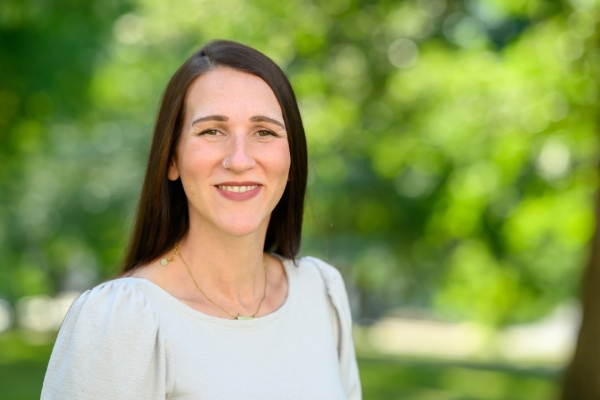Alicia Reigel Published in the Journal Communications Biology The first-year biology professor co-authored a paper titled “Sponge-derived matter is assimilated by coral holobionts.”
Alicia Reigel, assistant professor of biology at Washington and Lee University, recently co-authored a paper titled “Sponge-derived matter is assimilated by coral holobionts” that was published this month in the journal Communications Biology.
Communications Biology is in the nature family of journals and its articles represent significant advances that bring new biological insight to a specialized area of research. Reigel authored her article along with Cole Easson of Middle Tennessee State University, Michaela Bartley and Cara Fiore of Appalachian State University, Christopher Freeman of the College of Charleston and Amy Apprill from the Woods Hole Oceanographic Institution.
The article states that coral reef biodiversity is maintained via a complex network of nutrient-recycling pathways connecting organisms such as sponges and coral. Sponges have been known to take in nutrients produced by other organisms such as coral and algae, but no reciprocal link, in which corals take up nutrients produced by sponges, has been identified. The authors tracked the intake of sponge-produced nutrients by three different species of coral. They also determined that differences in nutrient intake among coral species correlated with their unique characteristics. These results make it clear that this newly uncovered recycling pathway for coral reefs can facilitate better management practices and improve coral aquaculture.
“The results of this research are so exciting because the relationship between sponges and corals on coral reefs was always thought to be antagonistic, with sponges deemed ‘bad’ for corals because they compete for space and other resources,” said Reigel. “However, our work showed that this relationship is much more complex with three species of corals taking up nutrients that are released into the water by sponges. The nutrients we tracked contained carbon and nitrogen, which are both essential to living organisms. Knowing that sponges are releasing these essential nutrients and that corals are willing and able to use them suggests a potentially beneficial relationship that was quite surprising. We have hopes that this knowledge could help improve coral aquaculture endeavors.”
Reigel came to W&L in 2023 from Appalachian State, where she performed postdoctoral research in biology since 2020. She holds a B.S. from the University of Minnesota, an M.S. from Georgia Southern University and a Ph.D. from Louisiana State University.
If you know a W&L faculty member who has done great, accolade-worthy things, tell us about them! Nominate them for an accolade.
 Alicia Reigel, assistant professor of biology
Alicia Reigel, assistant professor of biology
You must be logged in to post a comment.